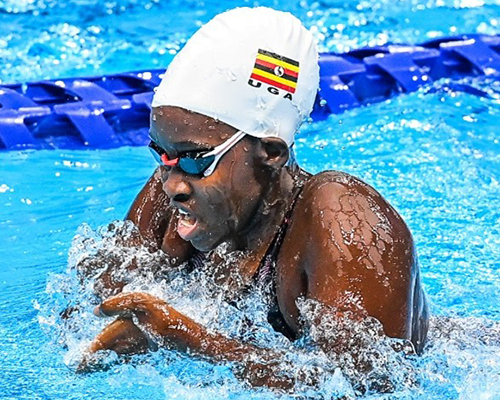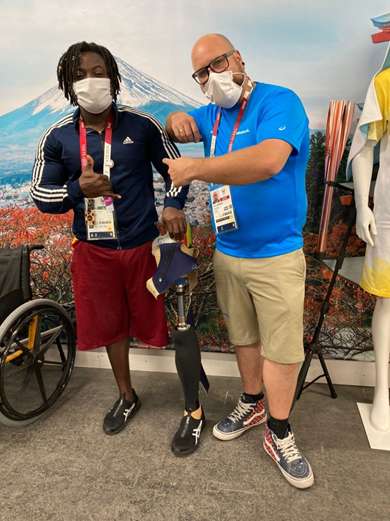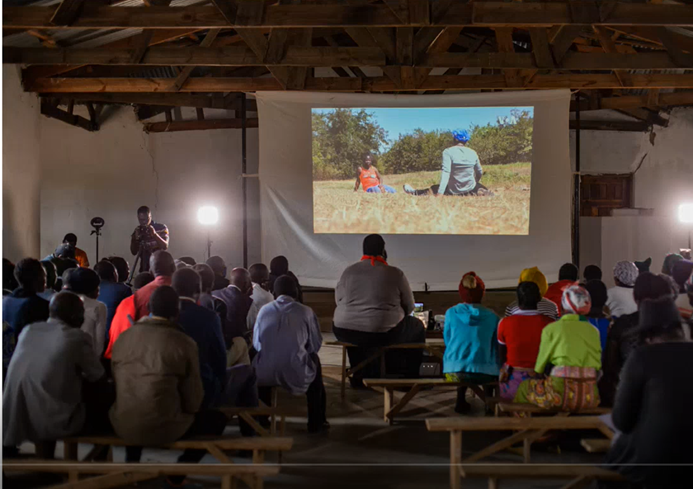Perspectives from Sub-Saharan Africa on the Tokyo 2020 Paralympic Games
Loughborough University London hosts second Knowledge Exchange Forum as part of the UK Aid funded AT2030 Para sport Against Stigma project.
Over 50 participants from countries such as Ghana, Germany, France, Malawi, Namibia, South Africa, UK, Zambia and Zimbabwe took part in the virtual Knowledge Exchange Forum on 17 and 18 November 2021. The event was hosted collaboratively by Loughborough University London, the International Paralympic Committee (IPC) and University of Malawi Chancellors College as part of the UK Aid funded and GDI Hub led AT2030 Para Sport Against Stigma (PSAS) project.
Building on the first Knowledge Exchange event, hosted in March 2021, the Forum also reflected on the Tokyo 2020 Paralympic Games from multiple perspectives across Sub-Saharan Africa. The Para Sport Against Stigma project brought the opening and closing ceremony and daily highlights of the Tokyo Paralympic Games to 49 Sub-Sharan African countries, many for the first time.
Day 1
Day 1 kicked off with a Q&A session featuring Husnah Kukundakwe hosted by Nyasha Mkharakurwa (Zimbabwean Paralympian and IPC membership programmes coordinator). Husnah, a Ugandan Paralympian in swimming and the youngest competitor at this summer’s Paralympic Games at just 14 years old, shared her emotions as flag bearer for her country:
“Holding the flag at the opening ceremony, it was nothing that I’ve ever done before and knowing that my whole family was behind the screens looking at me holding the flag, and the rest of the Uganda. I was really really honoured to represent my country at the Paralympics.”
Husnah went on to explain the significance of the Paralympic coverage in Uganda. In Uganda, she said, people with disabilities are rarely represented in the media and are often seen as people that can’t take care of themselves, thus limiting opportunities for education, employment, and sport. While she was disappointed that Ugandans still do not celebrate their Paralympians like the do for Olympians, she continues to advocate for social change. She encourages people with disabilities in her country to “never give up, no matter what society thinks of them” and attributes her mother as her biggest inspiration as she never gave up on her. She wishes other parents of children with disabilities to do the same!

Credit: James Varghese/IPC
After this, Maltese Paralympian Vladyslava Kravchenko hosted the first panel discussion of the Forum to explore preparation, training, and competition from the perspectives of Para athletes and coaches from Malawi and Zambia. Zambian Paralympian, Monica Munga, and her coach, Chrispine Mwale, emphasized that in Zambia one of the biggest challenges they face in recruiting and progressing Para athletes is classification. Athletes need to travel outside of Africa to undergo classification which is expensive. Both Monica and her teammate Joseph Lungu were classified in the World Para Athletics Grand Prix in Dubai 2021 with funding from the IPC’s Toyota funded NPC Development Programme, for instance.Monica competed in her first Paralympic Games and was thankful the Games were postponed a year as she became a mother just prior to the COVID 19 pandemic. She trained very hard to reach qualification standard after maternity leave reducing her time and running her personal best during Tokyo 2020.
Also on the panel was Tapiwa Kamanga, a Wheelchair basketball player from Malawi, who shared how she “enjoys playing basketball because of experience and interaction” but wishes she could play internationally. In Malawi, she explained, teams only compete at the local level and her club in Blantyre uses a set of wheelchair basketball chairs that were donated to the Kachere Rehabilitation and Training Centre.
Concluding the panel, Agnes Jamali who is the national coach for Para athletics in Malawi and coached Malawi’s only Paralympian, Taonere Banda, to reach the Tokyo 2020 Paralympic Games. Agnes spoke of the important role school education programmes like I’mPOSSIBLE and role models like Taonere have in building trust and confidence with parents to let their children with disabilities take part in sport and physical education. As she said:
‘Sometimes parents say no my child as she/he is can’t manage to do anything, so let them be at home. But there will be eight Para athletes competing at the upcoming African Union Zone 6 Games in December’.
Day 1 concluded with an insightful panel discussion about assistive technology in the context of Para sport, moderated by Holger Losch from No Boundaries (IPC Consultant).
Henry Larbi, who works at the largest full-service centre for prosthetics and orthotics in Ghana, explained how he met Tokyo Paralympian Emmanuel Nii Tetty Oku when he was an outpatient seeking a prosthetic leg. Emmanuel, who was also on the panel, has now gone on to be a national asset in Ghana. The centre designed a new prothesis for Emmanuel that he used for daily life in Tokyo 2020. Emmanuel saidalthough he doesn’t require his prothesis to compete in Para Powerlifting, wearing the prothesis while training and competing provides him with much more balance and stability. Henry, however, stressed how it is problematic that all components need to be imported from abroad. Kenneth Mubuyaeta fromDISA Care, Zambia (a centre that produces assistive products, mainly wheelchairs) also joined the panel and highlighted that major challenges in accessing assistive technology for sport is the viability of local materials and heavy taxes placed on assistive products.
The panellists encouraged the African Paralympic Committee, the International Paralympic Committee to invest and focus on partnerships to produce and manufacture assistive technology for Para athletes, which would have a massive impact on African participation in Paris 2024. They also encouraged university collaborations to develop research programmes to develop cost effective wheelchairs that are lighter and cost effective for the African context.

Credit: NPC Ghana
Day 2
Professor Mufunanji Magalsi from University of Malawi Chancellor College kick started day 2 by showing videos and photos to illuminate some exciting research findings exploring perceptions of disability and Para sport in rural Malawian communities.
Mufunanji’s research team hosted mobile screenings of the Tokyo 2020 TV highlights translated to Chichewa (Malawian language) in rural parts of Malawi. In Malawi, as he explained, only 12% of households have access to television. The team also used an innovative research method called theatre for development to explore perceptions of disability and Para sport with rural populations.
Participants expressed a lot of emotion and excitement as they watched Paralympic sport, as Prof Magalasi, said “shock came in in certain instances, like swimming where a person with physical disabilities, no arms was swimming but their ability to swim shocked a number of viewers”. One key finding was that people who care for disabled people in rural Malawi were mostly women. Also, seeing how other people with disabilities have taken part and won medals, and there was interest to know when this programme (Para sports) would come to their area and start training their children.

Credit: University of Malawi
After this, Sheila Mogalo (IPC Consultant) facilitated a fascinating conversation with Dr. Karen Smit (Vodacom, South Africa) and Bright Chiwaula (Country Director, Sight Savers Malawi) about general trends on disability inclusion in Africa.
Karen shared some insights from 24 years working on disability inclusion projects within Vodacom such as how a CEO’s commitment to disability inclusion agendas is so important in companies. She emphasised that hiring staff with disabilities and offering products and services that are accessible for customers is key to inclusion strategies. She also highlighted that creating an accessible infrastructure is sometimes the easier part in disability inclusion agenda but that fostering an inclusive work culture can be much more challenging.
Bright explained, ‘addressing disability inclusion is multi-faceted, and requires several approaches. Sport has been proven as one such area’. He said SightSavers first started supporting the Malawi Paralympic Committee and their athletes going to the Paralympic Games (Rio 2016 and Tokyo 2020) because of a newspaper appeal in 2016. The impact of Tokyo 2020 has been felt in Malawi because Paralympian Taonere Banda has inspired many young people with and without disabilities to take part in sport and improve their self-esteem. In Malawi, he said, many parents of children with disabilities are overprotective of their children and keep them out of school. But after Taonere visited a community meeting, many people were excited and conversations around disabilities opened up. As a result, children with disabilities who were not attending mainstream schools started to attend.
Both Karen and Bright expressed concerns about the absence of hype and awareness of disability inclusion between the Paralympic Games. Karen explained, ‘When the Games are on, everyone is excited and inspired – and when the Games are over disability is forgotten until the next 4 years.’ To try to change this, Vodacom is featuring one of South African Paralympian, Ntando Mahlangu and as the main hero of their summer campaign TV advent.
Day 2 concluded with and valuable panel discussion on Paralympic Games broadcasting from the Perspectives from national broadcasters moderated by Dr. Emma Pullen from Loughborough University.
The final discussion was between Wesysylas Chirwa (Malawi Broadcast Corporation) and Vincent Chupin and Angus Torode (TV Media Sport, France) with moderation from Dr. Emma Pullen (Loughborough University).
Wesysylas Chirwa is a sports presenter and producer in the Malawi Broadcast Corporation and the president of the Malawi Sport Writers Association of Malawi. He led the translation of the Tokyo 2020 highlights packages to Chichewa. Wesysylas explained that there were positive responses about the broadcasting, specifically “the organisations advocating for the rights of persons with disabilities were very much impressed that for the first time, allow Malawians to appreciate that people with disabilities are like any other person and can participate in any sporting activities”. However, he highlighted the one of the biggest challenges in engaging new audiences ahead of Paris 2024 Paralympic Games, is that there are very few Paralympic athletes representing African countries. local competitions and more investment from the government and corporate entities would certainly help, he stressed. Vincent Chupin and Angus Torode from TV Media Sport, France explained that broadcasting Paralympic programming for Tokyo 2020 and the previous 2019 Para Athletics World Championships was a first and a great learning experiencing from the TV Media Sport side. As angus said:
‘African competitors themselves, their interviews were superb, some of them spoke as disabled athletes and some about reaching pinnacle of their sporting careers. It showed Africa that disabled people were only disabled in a certain aspect and that the rest of them is the same as everyone else’.
In summary, the Forum provided a useful platform to share learning amongst partners and stakeholders involved with the Para Sport Against Stigma project. Learnings and insights will feed into the strategy leading into Paris 2024 Paralympic Games.
Find our more and get involved by visiting Para Sport Against Stigma, AT2030, or Global Disability Innovation Hub.